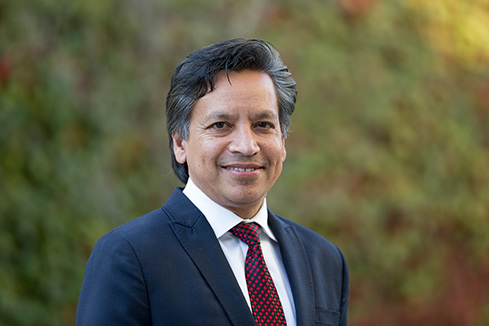
The life sciences are on the precipice of something akin to the industrial revolution, Deepak Srivastava, M.D., president of the nonprofit Gladstone Institutes, told an audience of Loyola Marymount University students, faculty, staff and alumni during an on-campus talk at the end of October.
“What a unique moment you sit in as science students today,” Srivastava said in his Seaver Spotlight address. “We finally have the opportunity to understand the code of life and to use it.”
Even though every aspect of medicine is better than it was 20 years ago, it’s not different. But 20 years from now, he said, medicine will be completely different.
Three advances will drive this transformation of medicine:
- Artificial intelligence and the mountains of data available through use of electronic health records
- Induced pluripotent stem cells (iPS cells) that enable development of an unlimited source of any type of human cell needed for therapeutic purposes
- CRISPR gene editing technology to alter the code where a mutation is occurring.
Srivastava, director of the Roddenberry Stem Cell Center at Gladstone and an attending pediatric cardiologist at UCSF’s Benioff Children’s Hospital, leads an elite biomedical research organization focused on heart, brain, viral and immunological diseases, leveraging these cutting-edge technologies and data science to overcome some of humankind’s most devastating conditions.
There, he and his teams have identified several genetic causes of heart disease and developed novel approaches for heart regeneration. In one example, they were able to identify the genetic cause of calcified valve disease in infants and worked to develop a drug to target it. Srivastava co-founded several biotechnology companies to advance discoveries into clinical trials.
“This story goes a long way from being just a physician,” he said. “We go from seeing the disease, to working as a scientist to understand the mechanism that causes it, to finding a drug for it. We’re now trying to get it into a clinical trial.”
This kind of work is a multidisciplinary effort, involving a range of fields from mathematics to engineering and chemistry to biology.
Srivastava’s career has progressed in ways he didn’t anticipate along the way, and his advice to students was to be open to new directions. Here are his career navigation tips:
- Be curious and try something. It’s well and good to follow your passion, but most people don’t really know what their passion is until later in life. Find a few things you like well enough and try them out.
- Define your vision, mission, and values. It makes decisions easier. Choices either fit your vision, mission, or values, or they don’t.
- Use your heart in making big decisions and logic for the small ones.
- Be proactive in finding mentors and maintaining relationships with them. This will provide you with a group of people who care about you that you can trust for advice at different stages of your career.
- Maintain a balance in your life. It’s not easy to do, but it’s a misconception that you can’t achieve success and enjoy your life.
Srivastava has worked throughout his career to make time for family life. Two of his three children, Claire and Dillion, are studying at LMU. His third, Sydney, is applying to attend as well.
Seaver Spotlight is the Frank R. Seaver College of Science and Engineering’s signature speaker series featuring leaders who share their experiences and career pathway as they seek to live a life of meaning and purpose.




